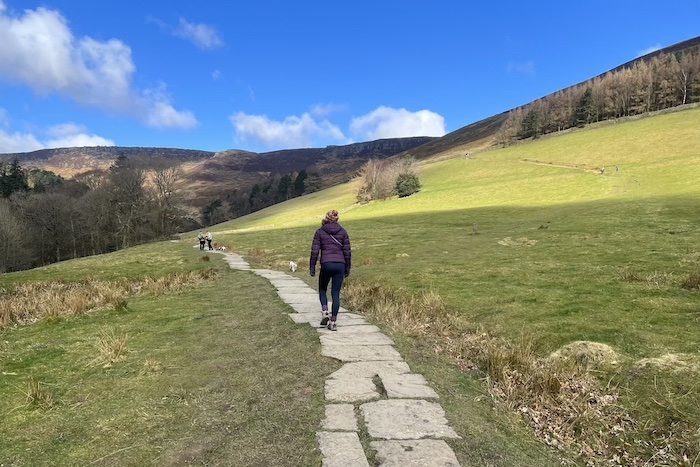10 reasons why walking is an excellent way to improve your mental health

by Dr Deborah Lee
Walking has never been more popular. Recent Ordnance Survey data shows an incredible 46% increase in the number of UK adults who took up distance walking in 2020 -2021.
We know that walking is good for physical health, but how does setting off on a long hike benefit our mental health? Why is walking good for the brain? How does tramping through hills, valleys, forests, mountains, and coastlines, affect our thoughts, emotions, mood, and mental state?
Here Dr Deborah Lee from Dr Fox Online Pharmacy gives us ten reasons why walking is an excellent way to support and improve your mental health.
Walking reduces stress
When we feel stressed, the sympathetic nervous system (SNS) – the ‘fight, fright, and flight’ system – has been switched on. We feel jumpy, with a pounding heart, rapid breathing, and slightly sweaty – ready to flee from danger. Modern life is stressful, and many of us live in the fast lane, brim full of adrenaline, and the stress hormone, cortisol.
Prolonged episodes of walking help to switch on the parasympathetic nervous system (PSNS) – the body’s natural rest and relaxation nerve pathway – and reduce adrenaline and cortisol levels.
Raises endorphins
Walking is a form of aerobic exercise which increases the production of β-endorphins within the brain. β-endorphins are the body’s own natural opiates, which bind to specific brain receptors, elevating mood, and inducing feelings of relaxation.
Neurotransmitters are increased
People suffering from stress, anxiety and depression are known to have lower levels of neurotransmitters. These are chemical messenger molecules which stimulate and coordinate the activity of brain neurons, such as serotonin and dopamine, and are vital for cerebral function.
Animal studies show that aerobic exercise increases the production of both serotonin and dopamine. Moderate intensity exercise also increases levels of glutamate and gamma aminobutyric acid (GABA) – neurotransmitters in the body’s involuntary inhibitory pathway.
Good for brain growth
Aerobic exercise increases levels of brain-derived neurotrophic factors (BDNF) – a protein the brain can’t do without for new nerve cell growth and development. Studies show BDNF levels in the hippocampus are reduced in depression and anxiety but raised by exercise. BDNF facilitates serotonin production and promotes the growth of neurons.
Helps the body acclimatise to stress
Anxiety sufferers are frequently over sensitive to any negative stimulus. If you think about it, exercise, such as walking, increases the heart rate and causes sweating. Both these symptoms are also anxiety symptoms. Regular walking may help anxiety sufferers to better tolerate these symptoms, and realise that when they come on, they are due to the natural body response to anxiety, and are not because they are in serious danger.
A distraction technique
When all’s said and done, walking gets you out of the house and away from whatever is stressing you. It’s a way of detaching from your troubles and focusing your thoughts on other things. Distraction is a well-recognised psychological tool for dealing with stress. It allows you to come back to your problems later, feeling more relaxed, and with a fresh approach.
Improves quality of life
Walking has many benefits for your mental, physical and spiritual health. Because mental and physical health are so closely intertwined, walking improves your over all quality of life. You can see this by the increasing numbers of people taking pilgrimages these days, as a life-affirming exercise.

As you traipse the countryside, even just visualising a wide range of different landscapes, induces feelings of calm and tranquility. Walking in nature has numerous health benefits, over and above walking in an urban environment. Interestingly, research has demonstrated that mountain walking is more beneficial for your mental health than exercising on a treadmill!
Relaxes the mind for those with mental illness
Laboratory studies in mice have shown that physical exercise helps reduce mental distress. It causes the production of specific brain neurons in the hippocampus, which quieten down excitatory brain activity.
Other research, also in mice, has shown that regular exercise promotes the development of new cells in the hippocampus which are needed for memory.
Can be a journey of self-realisation
Walking is a time when our little grey cells crank into action. In one research study, those who walked outside in the fresh air had twice as many creative thoughts as those who walked indoors, on a treadmill, in front of a blank wall. As you walk, you start to understand things from a different perspective.
Walking can be regarded as a journey of self-realisation, and a great way to improve self-confidence, self-esteem, and resilience.
Is a low-cost therapy for all with mental health problems
Walking is freely available to us all. What’s stopping you? All you need is a good pair of walking boots, a waterproof coat, and off you go!
There are so many ways to do it – whether you prefer to join a local walking group, go on a walking holiday, or simply plan your own hikes – the UK is full of beautiful trails waiting for exploration.
Stress is all around us – due to work, relationships, financial pressures and all the nuances of modern life. Psychologists believe that walking is one of the best low-cost, simple, forms of therapy for our mental health.
Any walking is good walking – even 10 minutes round the block. The worst thing you can do is be sedentary. But regular walks, distance walks, and hiking, are likely to bring the greatest mental health benefits.






